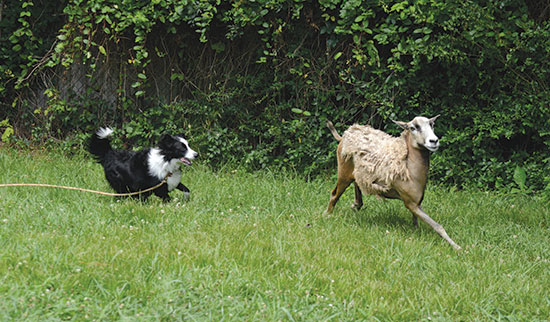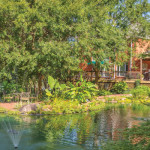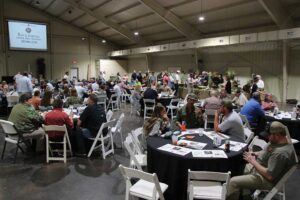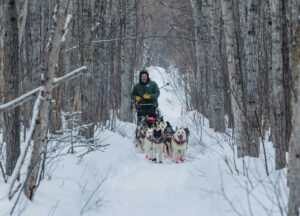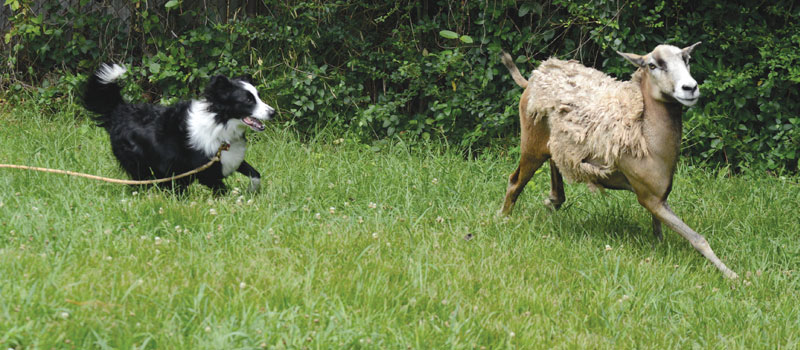
Leeds trainers teaching dogs to herd sheep
Story and photos
by Jim Smothers
There’s a bond between people and their dogs like no other – a type of teamwork found in few other relationships.
That’s what got Kim Crenshaw hooked on dog training, and what led her to Doyle Ivie. Together they are offering a new avenue for that type of teamwork in this part of the state.
While Crenshaw is an experienced obedience and agility teacher and trainer, she wanted to see how her dogs would respond to the challenge of herding sheep. After a workshop with Ivie at his Farmington, Georgia, ranch she has brought him to her home and training center in Leeds to give more central Alabama dog owners a chance to introduce their pets to sheep herding.
He is of the generation that doesn’t think about dogs as members of the family—they are tools, there to do a job, and he’s taken it on as his job to train them.
“Most of the time, the dogs have never even seen a sheep before,” he said, “and some of the people haven’t either.”
About a dozen people came out for Ivie’s latest workshop in Leeds. They got to see how their dogs would interact with the sheep and how well they would respond to new commands for moving the sheep to specific locations.
“Everything out there can think, that’s the problem,” he said. The sheep, the dog and the person all have a mind of their own. “That’s where the dedicated training comes in. There are a lot of variables. Everything is moving here. With agility and obedience, everything is still.”
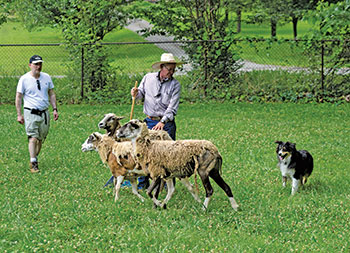 Ivie says he’s been “cowboying” all of his life and started training dogs about 20 years ago. It was during that time, while learning to use dogs to help move livestock, that he got acquainted with the late Bob Vest. Vest’s career and training methods are legendary in the herding dog community, and are recounted in The Traveling Herding Teacher.
Ivie says he’s been “cowboying” all of his life and started training dogs about 20 years ago. It was during that time, while learning to use dogs to help move livestock, that he got acquainted with the late Bob Vest. Vest’s career and training methods are legendary in the herding dog community, and are recounted in The Traveling Herding Teacher.
“He was a good instructor,” Ivie said. “I learned a lot from him, and he insisted that I start helping people.”
At his ranch Ivie has a herd of just over 100 sheep. Keeping them healthy can be a challenge, mainly due to feet problems and parasites. He said livestock have to be trained to the dogs, too, so that their reactions to the dogs can help move the herd and keep it together.
“The entire herd doesn’t have to be trained, just enough to start the herd moving,” he said.
It’s up to the shepherd and the dog to direct their movement, whether it’s to the “way side” (counterclockwise) or the “by side” (clockwise).
He cautions that herding can be dangerous.
“It’s a contact sport,” he said.
It’s up to the shepherd to train his or her dog not only how to move the herd, but how to stop it. In training and competition, the herd is typically between the shepherd and the dog, with hand signals used for direction and to stop movement by having the dog lie down.
“When you get tired of having your knees knocked off, you’ll learn to stop that dog!” he said.
Crenshaw said there are some big misconceptions about herding.
“It’s not chasing,” she said. “Some people say their dog would be good at herding because he likes to chase bicycles or something. It’s not about chasing or nipping at them (the sheep). It’s usually trying to push the sheep back to the person. When you see the dog get behind the sheep and push them toward the person, that’s instinct. It’s really cool to watch.”
After the workshop, Crenshaw and Ivie took the summer off from working with the sheep. The summer heat is just too much for them. They plan to pick it back up in the early fall, but no date had been set as of this writing.
“I think everyone had a good time,” she added. “The beginners got a good taste of it, and there is nothing else offered in the Birmingham area for herding dogs.”
For dogs and handlers with herding experience, it’s a great opportunity to work with sheep.
Some dogs pick up on the skills very quickly, with an intuitive sense of how to move with the sheep. Others need more time to catch on.
“You can take five young dogs that have never seen sheep before, and some will turn on,” Crenshaw said. “Some don’t. Some seem confused. It can take a little bit of coaxing for them to know it’s okay to move them because they know they are not supposed to chase other animals.”
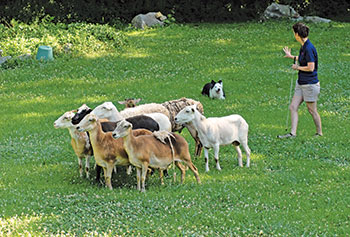 Crenshaw and Ivie both have extensive resumés in the dog-training world. Ivie has a background as a competitor, trainer and judge in organizations including the AHBA, AKC and ASCA among others. Crenshaw has been a professional trainer for more than 25 years and is a judge for agility, rally obedience and obedience competitions.
Crenshaw and Ivie both have extensive resumés in the dog-training world. Ivie has a background as a competitor, trainer and judge in organizations including the AHBA, AKC and ASCA among others. Crenshaw has been a professional trainer for more than 25 years and is a judge for agility, rally obedience and obedience competitions.
“Really, it’s all based in obedience,” Crenshaw said. You have to have a good relationship with the dog, to be able to read the dog, tell what they’re thinking, and communicate what their role is. All the dogs have to be good at walking on leash and have a great recall in agility or sheep herding.
“If the sheep are going where you don’t want them to go, you have to be able to call them off. They have to be able to go, come and stop. Those are skills you have to have with any of the sports. If you want to do hunting, a retriever has to have those skills, too. Those foundation skills of obedience are the foundation skills for all of the extra games you play with your dog.”
She added that a number of games and activities have been developed to encourage owners to spend more recreational time with their dogs, whatever the breed or instincts. Any dog owner should be able to find some type of activity suitable for his or her dog.
“Whatever dog a person has in their backyard, there’s something it can do and enjoy,” she said. “If it has a good nose for tracking, you can make a game out of finding lost things. There are so many dog sports that are so much fun and can get people and dogs off the couch. There are plenty of opportunities for physical and mental activities.”
The dogs and handlers at the latest workshop demonstrated a wide range of abilities and aptitudes for herding during the two days of working with the sheep.
“I think everyone had a good time,” Crenshaw said.
For more about Crenshaw and Ivie, visit
www.bhamdogtrainer.com and www.woodsendstockdog.com











